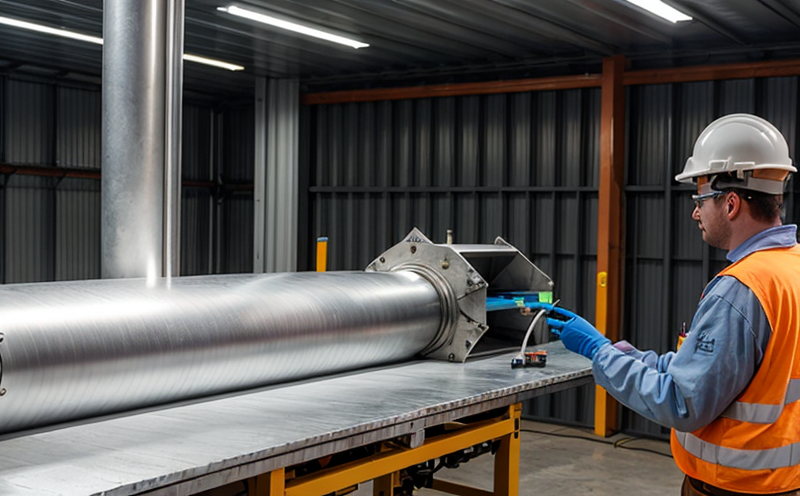ISO 10893 Eddy Current Testing of Metallic Tubes in Renewable Systems
The ISO 10893 standard provides a robust framework for non-destructive testing (NDT) using eddy current methods, which is particularly suited for inspecting metallic tubes used in renewable energy systems. These tubes are critical components in various applications such as wind turbine blades, solar thermal collectors, and geothermal heat exchangers. Ensuring the integrity of these materials through rigorous inspection not only enhances safety but also extends the operational lifespan of renewable technologies.
ISO 10893 testing is essential for detecting internal defects like cracks, voids, or porosity that may compromise the structural integrity of metallic tubes. The eddy current technique leverages electromagnetic fields to create circulating currents within conductive materials, allowing for detailed inspection without altering the component's physical properties. This non-invasive approach ensures that critical components are evaluated accurately and reliably.
For quality managers and compliance officers, ISO 10893 testing is a cornerstone of material integrity assurance. It provides a standardized method to identify potential weaknesses in metallic tubes used in renewable systems. By adhering to this international standard, organizations can ensure consistent test results across different facilities and locations, thereby enhancing the reliability of their products.
R&D engineers benefit from ISO 10893 testing as it allows them to iteratively refine design parameters for new materials and components. Through continuous improvement based on rigorous NDT practices, they can introduce safer and more efficient solutions into the market sooner. Procurement teams also find value in this service, ensuring that only high-quality, compliant materials are sourced.
The testing process involves several key steps: specimen preparation, application of eddy current probes, data acquisition, and analysis. Specimens must be cleaned and degreased to ensure accurate readings. Eddy current probes are then used to scan the internal structure of the tubes, capturing detailed images that can reveal defects. Data is analyzed using sophisticated software, which generates comprehensive reports detailing any issues identified.
Quality assurance through ISO 10893 testing ensures compliance with international standards and regulations, thus protecting both the environment and human health. This service supports the broader goals of sustainability by reducing waste associated with defective components and promoting efficient use of resources.
In conclusion, ISO 10893 eddy current testing is a vital component in ensuring the reliability and safety of metallic tubes used in renewable energy systems. By adhering to this standard, organizations can enhance their reputation for quality and commitment to sustainability, ultimately contributing to the global shift towards cleaner energy sources.
Quality and Reliability Assurance
- Data Accuracy: Our team employs advanced software tools to ensure precise data acquisition and analysis.
- Consistency: We maintain strict adherence to ISO 10893 standards, ensuring consistent results across all tests.
- Compliance: All testing procedures comply with international standards, guaranteeing regulatory compliance.
- Reporting: Comprehensive reports are provided, detailing any defects and their locations within the tubes.
Our commitment to quality is reflected in our rigorous adherence to ISO 10893 guidelines. By ensuring consistent results and compliance with international standards, we provide peace of mind to our clients, knowing that their products meet the highest industry benchmarks.
International Acceptance and Recognition
The International Organization for Standardization (ISO) establishes global standards that promote consistency and interoperability in various fields. ISO 10893 eddy current testing is widely recognized across industries, including renewable energy, where the integrity of metallic components is paramount.
Many leading organizations in renewable energy sectors around the world have adopted this standard for its reliability and accuracy. By using ISO 10893, companies can ensure that their products meet stringent quality requirements and are accepted internationally. This recognition enhances trust and credibility within the industry, fostering stronger partnerships and collaborations.
Regulatory bodies worldwide also endorse the use of ISO standards, further emphasizing their importance in maintaining high-quality standards. Adherence to these guidelines helps manufacturers comply with local regulations while expanding into international markets. As a result, ISO 10893 eddy current testing has become an indispensable tool for ensuring product integrity and reliability.
Environmental and Sustainability Contributions
The use of ISO 10893 eddy current testing contributes significantly to environmental sustainability by promoting the longevity and efficiency of renewable energy systems. By identifying defects early in the production process, this service helps prevent the premature failure of components, reducing waste and resource consumption.
Furthermore, ensuring the integrity of metallic tubes used in renewable applications directly supports broader efforts towards green energy initiatives. Reliable materials extend the operational lifespan of wind turbines, solar collectors, and geothermal heat exchangers, thereby maximizing their environmental benefits. This not only reduces carbon footprints but also promotes more sustainable resource management.
By adhering to ISO 10893 standards, companies can contribute positively to global sustainability goals. The service encourages responsible manufacturing practices that prioritize both quality and environmental impact, fostering a culture of eco-consciousness within the industry.





